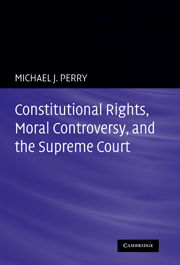Book contents
- Frontmatter
- Contents
- Acknowledgments
- Introduction: A (partial) Theory of Judicial Review
- 1 Human Rights: From Morality to Constitutional Law
- 2 Constitutionally Entrenched Human Rights, the Supreme Court, and Thayerian Deference
- 3 Capital Punishment
- 4 Same-sex Unions
- 5 Abortion
- 6 Thayerian Deference Revisited
- Postscript: Religion as a Basis of Lawmaking? Herein of the Non-establishment of Religion
- Index
2 - Constitutionally Entrenched Human Rights, the Supreme Court, and Thayerian Deference
Published online by Cambridge University Press: 05 July 2009
- Frontmatter
- Contents
- Acknowledgments
- Introduction: A (partial) Theory of Judicial Review
- 1 Human Rights: From Morality to Constitutional Law
- 2 Constitutionally Entrenched Human Rights, the Supreme Court, and Thayerian Deference
- 3 Capital Punishment
- 4 Same-sex Unions
- 5 Abortion
- 6 Thayerian Deference Revisited
- Postscript: Religion as a Basis of Lawmaking? Herein of the Non-establishment of Religion
- Index
Summary
Felix Frankfurter described [James Bradley Thayer], his teacher, as “our great master of constitutional law.” Thayer, said Frankfurter, “influenced Holmes, Brandeis, the Hands (Learned and Augustus) … and so forth. I am of the view that if I were to name one piece of writing on American Constitutional Law – a silly test maybe – I would pick an essay by James Bradley Thayer in the Harvard Law Review, consisting of 26 pages, published in October, 1893, called ‘The Origin and Scope of the American Doctrine of Constitutional Law’ … Why would I do that? Because from my point of view it's a great guide for judges and therefore, the great guide for understanding by non-judges of what the place of the judiciary is in relation to constitutional questions.”
I explained in the preceding chapter why it makes sense for a liberal democracy to entrench (certain) human rights laws. Whether it also makes sense for a liberal democracy to empower its courts to protect (enforce) the entrenched human rights laws is a separate question. “One can have a constitution of entrenched rules but leave the interpretation of those rules to democratic decision making, and many countries do just that.” But why would a liberal democracy choose on the one hand to entrench norms and on the other not to empower its courts to protect the norms?
- Type
- Chapter
- Information
- Publisher: Cambridge University PressPrint publication year: 2008

